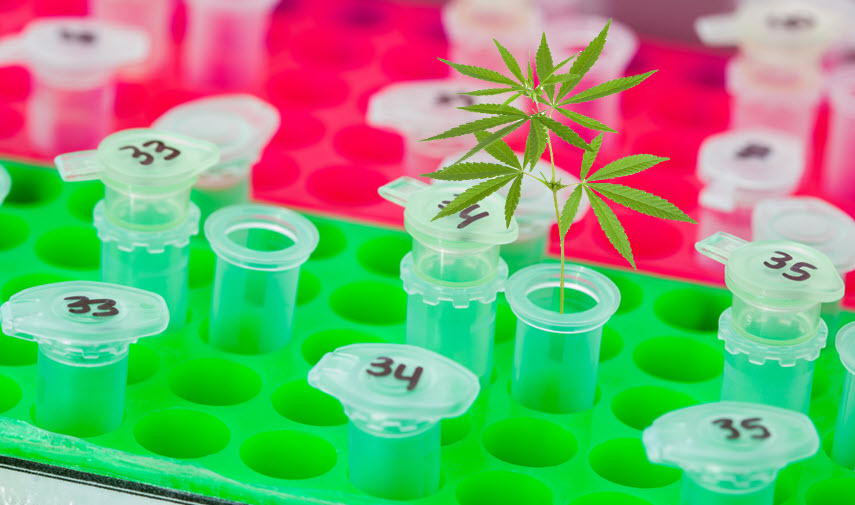
EPM301 – An acid in cannabis that is much more potent than cannabinoids, says Dr. Raphael Mechoulam
The recent popularity and acceptance of medicinal cannabis is largely due to the effects of cannabinoids. Along with terpenes and other phytochemical molecules, they result in a variety of medicinal and recreational effects. However, a recent discovery by Professor Raphael Mechoulam, known as the father of cannabis research, could soon change the world of what we know about cannabis and cannabinoids. What is this discovery? How important is it to the previously established knowledge of cannabinoids? Read on as we shed light on this and much more.
Research by renowned cannabis researcher Professor Raphael Mechoulam in 2020 led him to the discovery of cannabidiolic acid methyl ester (EPM301). This research provided the cannabis world with its first acid-based synthetic cannabinoid molecule and, as expected, caused quite a stir. The newly patented compound seemed destined to change the world of medicinal cannabis for the better.
The compound is named EPM301 because the success of the research is based on the researcher’s partnership with a US biotech company called EPM. The company has long stood out as one of the companies trying to bridge the gap that exists between the pharmaceutical and cannabis industries. EPM is taking all the right steps to redefine how the world sees CBD and ultimately maximize its potential as a pharmaceutical drug. This was the speech of Reshef Swisa, CEO of EPM, and Dr. Mechoulam, who shed more light on the making of EPM301 and its potential in a recent interview.
Most people are unaware that THC and CBD are secondary substances in the cannabis plant matrix. These are products derived from the parent substances of cannabis, which act as precursors. According to Professor Mechoulam, these original substances were the target of EPM when trying to unravel the mysteries of the cannabis plant.
One of the starting materials found in cannabis plants are cannabidiolic acids. These acids appear early in cannabis plants before they produce secondary compounds like cannabinoids. According to Professor Mechoulam, these unused acids are even more special as they are far more potent than the cannabinoids on which most medicinal cannabis is built. The one issue that has long limited research into the potential of cannabidiolic acids is their instability. This unstable nature then makes them unsuitable for use as pharmaceutical products. This lasted until the success achieved by recent research by Professor Mechoulam.
While trying to harness the beneficial properties of cannabidiolic acids, Professor Mechoulam developed a chemical means to keep the compound stable enough for use. The method used in the research was esterification of the acid to produce a simple and stable ester. This modification of the acids maintains the integrity of the acids needed for its activity and helps make it stable enough for further pharmaceutical experimentation. Such was the statement made by EPM’s CEO, Reshef Swisa, as she explained how the research team worked to overcome the compound’s stability setback.
Once stability was established, the team quickly attempted to identify the compound’s medical activities. The researchers discovered that the stable compound is effective in suppressing anxiety and nausea. This is similar to the calming and relaxing effects of CBD. The compound also showed promising signs for cancer patients undergoing chemotherapy, as well as those with psoriasis or irritable bowel disease.
Professor Mechoulam is no stranger to the world of cannabis research and the usefulness of THC and CBD for conditions such as depression, nausea and anxiety. His research in the 1960s is crucial in discovering the endocannabinoid system in the human body. This helped in understanding the indirect and direct relationship that cannabinoids have with endocannabinoid receptors to elicit medicinal effects. This gave him the title of father of cannabis research.
The same man, now 88 years old, has made an amazing discovery about cannabidol acids, which he claims are more potent than CBD or THC with no known negative side effects. Although there is still a significant need for research into the compound, the results of the research are already promising. The compound is said to be able to perform the medicinal activities of CBD, THC, and more. This makes it more potent than other cannabinoids, according to Professor Mechoulam.
Professor Mechoulam believes this discovery of EPM301 comes at an opportune time as the medical world urgently needs new drugs to fight disease. Although some drugs are already available, they have serious side effects. This is the current reality with steroids and opioids causing other issues that require attention due to their side effects. EPM301 can serve as a viable alternative to replace these drug families.
CBD has long been touted as a viable alternative to addictive prescription drugs, but efficiency has always been the issue. The new patent for cannabidiolic acid corrects this, as research shows it can replace traditional drugs without reducing efficiency. This was demonstrated in research on the drug when it was compared to two conventional drugs for IBD. The first drug was prednisone (a steroid) and the other was a biologic drug. The result of the test shows that the activity of EPM301 was similar, which helps to increase optimism for the future.
Professor Mechoulam’s closing words were excitement and hope for what cannabidiolic acids can become in the medicinal market in the years to come. He also warned against misclassifying medicines as medicinal uses without proper procedure. This is to prevent medical use of cannabis from being confused with recreational use and little or no consideration given to the indication and dosage of the drug.
MORE ABOUT EPM301, READ MORE…

WHAT DOES RESEARCH SAY ABOUT EMP301 ACID?

Post a comment: